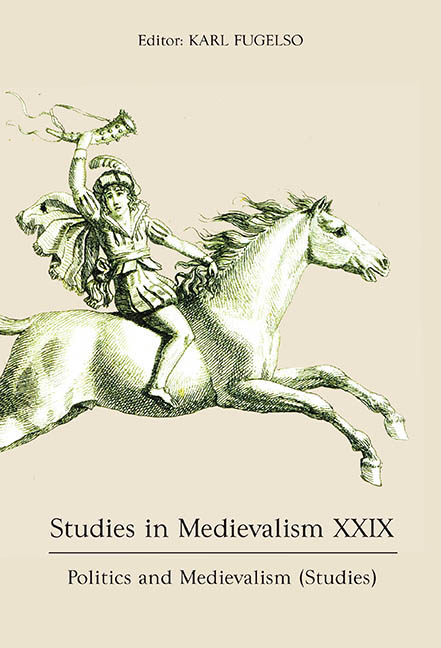Book contents
- Frontmatter
- Studies in Medievalism
- Acknowledgments
- Contents
- List of Illustrations
- Preface
- I Essays on Politics and Medievalism (Studies)
- Historical Malapropism and the Medieval Blood Libel in American Politics
- Putin’s Medieval Weapons in the War against Ukraine
- The Battle of Tours and the US Southern Border
- Medievalism, Brexit, and the Myth of Nations
- An Arthur for the Brexit Era: Joe Cornish’s The Kid Who Would be King
- II Other Responses to Medievalism
- Angle-ing for Arthur: Erasing the Welsh in Guy Ritchie’s King Arthur: Legend of the Sword
- Chasing Freyja: Rape, Immigration, and the Medieval in Alt-Right Discourse
- “Things painted on the coarse canvas”: Political Polemic in Jean-Paul Laurens’s Portrait of the Child Emperor Honorius
- Longfellow and Old English
- Archaeology and Medievalism at Julian of Norwich’s Anchorite Cell
- A Revelation of Love: Christianity, Julian of Norwich, and Medieval Pity in the Harry Potter Series
- In the Beginning Was the Word: How Medieval Text Became Fantasy Maps
- Objectivity, Impossibility, and Laughter in Doctor Who’s “Robot of Sherwood”
- Sonic Medievalism, World Building, and Cultural Identity in Fantasy Video Games
- Contributors
- Miscellaneous Endmatter
Historical Malapropism and the Medieval Blood Libel in American Politics
Published online by Cambridge University Press: 19 August 2020
- Frontmatter
- Studies in Medievalism
- Acknowledgments
- Contents
- List of Illustrations
- Preface
- I Essays on Politics and Medievalism (Studies)
- Historical Malapropism and the Medieval Blood Libel in American Politics
- Putin’s Medieval Weapons in the War against Ukraine
- The Battle of Tours and the US Southern Border
- Medievalism, Brexit, and the Myth of Nations
- An Arthur for the Brexit Era: Joe Cornish’s The Kid Who Would be King
- II Other Responses to Medievalism
- Angle-ing for Arthur: Erasing the Welsh in Guy Ritchie’s King Arthur: Legend of the Sword
- Chasing Freyja: Rape, Immigration, and the Medieval in Alt-Right Discourse
- “Things painted on the coarse canvas”: Political Polemic in Jean-Paul Laurens’s Portrait of the Child Emperor Honorius
- Longfellow and Old English
- Archaeology and Medievalism at Julian of Norwich’s Anchorite Cell
- A Revelation of Love: Christianity, Julian of Norwich, and Medieval Pity in the Harry Potter Series
- In the Beginning Was the Word: How Medieval Text Became Fantasy Maps
- Objectivity, Impossibility, and Laughter in Doctor Who’s “Robot of Sherwood”
- Sonic Medievalism, World Building, and Cultural Identity in Fantasy Video Games
- Contributors
- Miscellaneous Endmatter
Summary
The blood libel was the false accusation lodged against Jewish communities that they ritually murdered Christian children for their blood, usually during the week of Passover, frequently in a ceremony mocking Christ's passion. The blood libel was not particular to the Middle Ages, though its origins in the popular imagination are firmly rooted in the medieval world, notably with the boy martyrs William of Norwich and Hugh of Lincoln, whose murders were libelously imputed to Jews. As historians have observed, the medieval blood libel persisted even after the Middle Ages ended. This article examines how the blood libel has been wrested from its medieval context and referenced in contemporary political discourse. The task of exploring the politics of the medieval blood libel has become urgent for scholars specializing in medievalism, given the rise of white nationalism and anti-Semitism, particularly in online spaces, and how racist ideologies have been entangled with fallacious views of the Middle Ages as a golden age for white, homogenous, Christian societies.
To the extent that non-Christian, religious minorities – and indeed all non-white Europeans and non-Europeans – have been subjects of interest in popular representations of the Middle Ages, their place in medieval society has always been understood to be in opposition to some imagined normative social order. In some cases, as with broad allusions to heretics and pagans, the “other” is anchored in historically muddied waters. In the case of Jews and the blood libel, there is a more insidious sensibility at play, one that ascribes essentialist and deeply troubling attributes to a whole category of people. The blood libel has been ripe for conveying varying degrees of, what I call, historical malapropism, or the misappropriation of the medieval past to draw similarities with the present. When American politicians or pundits use the term “blood libel” to describe the victimization of themselves or others, it may illuminate a better understanding of how medievalism and the history of religious minorities – in this case, Jews – have intersected in public discourse. Historical malapropism depends not only on erroneous understanding of history, but also on the idea that historical precedent, however invoked, gives substance, gravitas, and explanation for current-day conflicts.
- Type
- Chapter
- Information
- Studies in Medievalism XXIXPolitics and Medievalism (Studies), pp. 3 - 12Publisher: Boydell & BrewerPrint publication year: 2020



